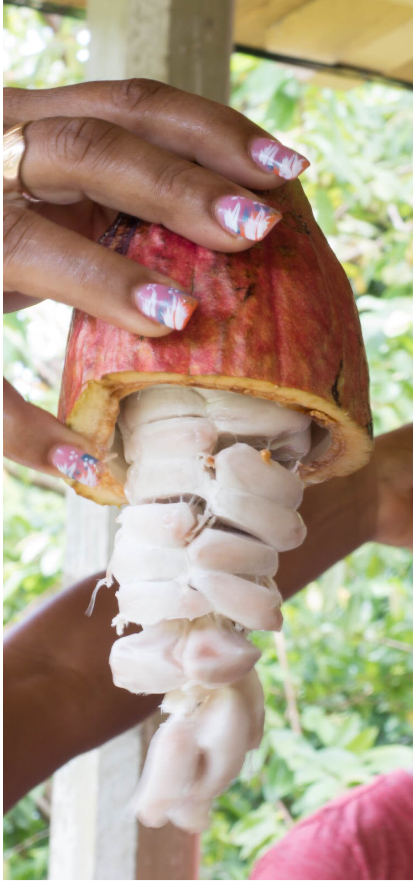Editorial: Hershey Company Needs to End the Sourcing of Cacao from Slave Labor
A person holds an opened cacao pod. The beans of the pod are used in chocolate production. (Ian Glover/CC BY-NC 2.0)
December 2, 2021
Chocolate is a confection that is loved by many, but beneath its sweet taste lies the labor of heavily underpaid farmers in West African countries.
The Hershey Chocolate Company should not source cacao farmed by slave and child laborers.
Continuing to use cacao farmed by exploited laborers would be a violation of human rights. Only 42 percent of cacao farmers in the west African country of Cote d’Ivoire earn an amount above extreme poverty, and only 23 percent earn a living income as stated by True Price. With such a low pay rate, many farmers in the cacao industry are barely able to survive off this income.
Additionally, more than 1.56 million farmers were child laborers, 43% of which were engaged in dangerous labor in cacao growing regions, according to a report by the United States Department of Labor. Some examples of dangerous labor in the cacao industry include agrochemical exposure, along with heavy load lifting in the fields and factories. These hazards pose a great risk to their lives and deserve a much higher pay to do such a dangerous job.
The Hershey Company has pledged to be ethical in the past, so the corporation should follow through with their promises. In 2001, global chocolate companies including Hershey committed to the Harkin-Engel protocol which agreed that they would use ethically sourced cacao. However, they still continue use child labor in several different countries, over two decades later.
A study from NORC from the University of Chicago found that there has actually been an increase in dangerous forms of child labor in chocolate production in countries such as Cote d’Ivoire and Ghana from 2008 to 2018. Hershey’s sourcing of chocolate from these regions without taking action will cause this to continue.
According to Confectionery Production, they even purchased over 30 thousand tons of cacao to evade the living income differential, a premium that is paid to raise wages for cacao farmers. Hershey has been banned from sustainability programs in Cote d’Ivoire and Ghana as a result.
Halting the sourcing of unethical cacao will put them in a more positive light. Hershey was involved in several lawsuits, one of them being Nestle USA Inc. v Doe, a federal lawsuit filed on behalf of former child chocolate laborers against big chocolate companies including Hershey and Nestle. Although the companies ended up winning, it would not be a good look for them if they continue to use unethical chocolate sources. Other chocolate companies have begun to stop, so Hershey should do so as well.
To help resolve the issue of unethical labor in chocolate, buy ethical chocolate brands that do not use child and slave labor. A list of these companies can be found on Slave Free Chocolate.







